The Temperature Detection Screen Market is estimated to be valued at USD 1.9 billion in 2025 and is projected to reach USD 9.1 billion by 2035, registering a compound annual growth rate (CAGR) of 16.9% over the forecast period.
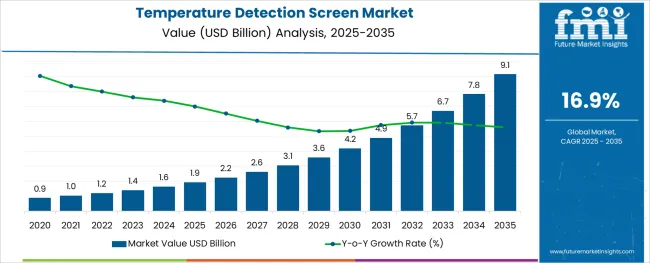
The temperature detection screen market is undergoing significant transformation, supported by rising public health surveillance, workplace safety mandates, and advancements in non-contact diagnostic technologies. Governments and private sectors have intensified focus on early detection of febrile symptoms to prevent infectious disease outbreaks and ensure operational continuity in high-traffic environments.
Technological improvements in thermal imaging, AI-assisted temperature recognition, and real-time data integration are reshaping how body temperature is screened across transport hubs, educational campuses, industrial settings, and healthcare facilities. Manufacturers are developing systems with higher accuracy, reduced false-positive rates, and faster scanning capabilities, making them ideal for large-scale, real-time monitoring.
Additionally, increasing investment in smart city infrastructure and health-tech readiness is expected to support market growth. As portable devices gain traction and use cases extend beyond emergencies into long-term health monitoring strategies, the market is positioned for sustained expansion across geographies and sectors.
The market is segmented by Product, Type, and End Use and region. By Product, the market is divided into Infrared Thermal Scanning Cameras and Contactless Temperature Detectors. In terms of Type, the market is classified into Portable/Handheld and Fixed/Mounted. Based on End Use, the market is segmented into Healthcare, Government and Law Enforcement, Military and Defence, Transportation and Logistics, Commercial Spaces, Energy and Power, and Others. Regionally, the market is classified into North America, Latin America, Western Europe, Eastern Europe, Balkan & Baltic Countries, Russia & Belarus, Central Asia, East Asia, South Asia & Pacific, and the Middle East & Africa.
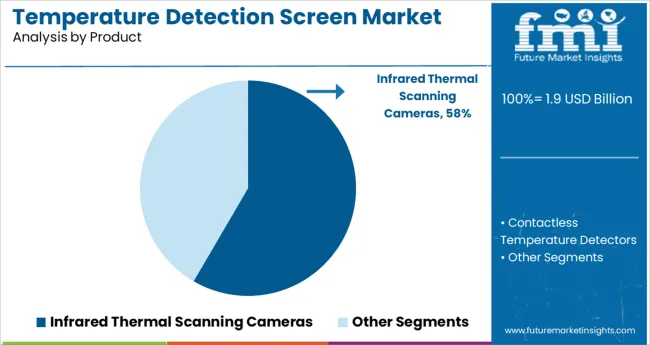
Infrared thermal scanning cameras are anticipated to hold 58.4% of the total product category revenue in 2025, making them the leading product type in the temperature detection screen market. This dominance is being driven by their superior accuracy in detecting temperature variations, fast response time, and non-invasive functionality.
These cameras have become central to contactless screening initiatives in public and private sectors due to their ability to capture real-time thermal images while maintaining physical distancing protocols. Additionally, advancements in infrared sensor resolution, coupled with software integrations that enable automatic anomaly detection, have increased their reliability across a variety of operating conditions.
Their deployment in airports, factories, hospitals, and government buildings has been accelerated by institutional demand for robust screening systems capable of operating in high-traffic environments. These advantages, along with scalable deployment and minimal training requirements, have reinforced the segment’s leadership in the market.
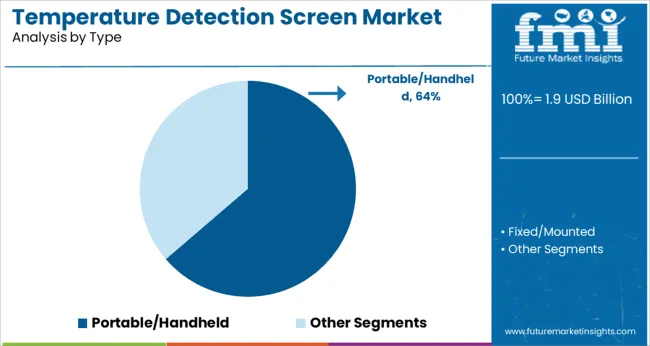
The portable or handheld segment is projected to account for 63.7% of the total market revenue by 2025, positioning it as the dominant type in the temperature detection screen market. This leadership is supported by the flexibility, mobility, and cost-effectiveness offered by handheld devices, especially in decentralized and temporary screening setups.
These devices have been widely adopted across healthcare, corporate, and public venues due to their ease of use, quick deployment, and capability for on-demand temperature measurement. Improvements in battery life, thermal resolution, and lightweight design have made handheld scanners increasingly attractive for both frontline health workers and facility managers.
Furthermore, the growing demand for non-permanent screening infrastructure in education, logistics, and field services has favored portable solutions. Their ability to provide consistent readings in varying environmental conditions has also reinforced their preference over fixed installations in many operational contexts.
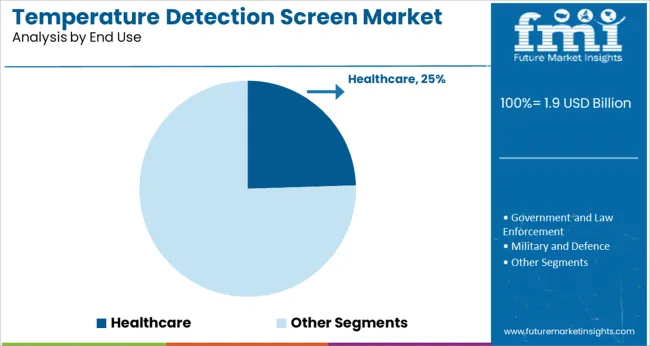
The healthcare segment is expected to contribute 24.5% of total market revenue in 2025, establishing it as a key end-use sector in the temperature detection screen market. This share is being driven by the critical need for infection control, patient screening, and workforce protection within hospitals, clinics, and diagnostic centers.
Temperature screening has become a foundational protocol in triage, outpatient departments, and entry points for both patients and staff. The healthcare sector has prioritized investment in thermal detection systems that align with clinical-grade accuracy, data logging, and integration with hospital information systems.
Furthermore, increasing healthcare infrastructure development in emerging regions, combined with global health preparedness initiatives, has supported widespread adoption. The ability of these systems to enhance operational efficiency while reducing cross-contamination risks has positioned them as a core component of health facility safety protocols, reinforcing the segment’s growth trajectory.
| Market Statistics | Details |
|---|---|
| H1,2024 (A) | 14.6% |
| H1,2025 Projected (P) | 15.0% |
| H1,2025 Outlook (O) | 15.5% |
| BPS Change : H1,2025 (O) - H1,2025 (P) | (+) 47 ↑ |
| BPS Change : H1,2025 (O) - H1,2024 (A) | (+) 94 ↑ |
As per Future Market Insights, temperature detection screens are playing an important role in commercial spaces as they offer contactless screen that helps protect public health in indoor environments. These screens provide consistent and efficient results.
Such benefits are accelerating the demand of temperature detection screen. A spike of 47 units in BPS values observed in the temperature detection screen market in H1, 2025 - Outlook (O) over H1, 2025 Projected (P). The COVID-19 epidemic had a favorable effect on the market for temperature detection screens.
Temperature detection screen production and sales increased as a result of the need to control individual body temperatures during the pandemic in order to check for potential viruses.
Moreover, compared to H1, 2024 (A), the temperature detection screen market increased by 94 BPS in H1 -2025. As per FMI, the temperature detection screen has a wide range of uses, including military activities.
For day-night surveillance and thermal target detection in military operations, temperature detection screens, particularly thermal scanners, are used. Due to such factors, the temperature detection screen market is expected to grow at a robust rate.
Thermal imaging techniques have become immensely popular in recent times and especially demand from industrial applications has been significant. For accurate thermal readings, temperature detection screens are essential and enable manufacture rs to detect faults that are invisible to the naked eye.
Rising scope of application in multiple end-use industries, rapid advancements in thermal technologies, increasing demand from the security and surveillance industry, and military and defence industry are some of the prominent trends that are anticipated to guide demand for temperature detection screening products.
Portable temperature detection screens are anticipated to see higher demand than fixed temperature detection screens. This can be attributed to the rising preference for portable temperature detection screens from healthcare organizations and military organizations.
Consumption of temperature detection screening devices is estimated to rise at an astronomical CAGR of 16.9% from 2025 to 2035.
“Rising Scope of Application in Military & Defence Sector to Influence Temperature Detection Screen Sales”
Thermal imaging has found immense scope of utilization in the military and defence industry vertical. Thermal scanners are largely popular in military applications as they offer day-night observation and thermal target detection. Rapid innovative advancements in military technologies are anticipated to boost sales of temperature detection screens.
Increasing demand for security and surveillance applications in the military is expected to be a major trend promoting temperature detection screening equipment demand. Temperature detection screen manufacturers are focusing on innovating products to get military contracts and boost their revenue potential across the global market landscapes.
Military and defence sector currently holds a market share of 18.8% in the global temperature detection screen industry landscape in 2025.
“North America to Hold Dominant Stance in Terms of Temperature Detection Screen Consumption”
The temperature detection screen market metrics for regions such as North America, Latin America, Europe, East Asia, South Asia & Pacific, and the Middle East & Africa (MEA) have been discussed in detail in this research report.
The North America temperature detection screen market is expected to maintain a dominant outlook throughout the forecast period. Rising prevalence of infectious diseases and the presence of key market players are expected to influence temperature detection screen sales in this region.
Demand for temperature detection screens is anticipated to see major growth in the European region. Rapidly developing healthcare infrastructure and rising number of clinical trials in this region are expected to fuel market potential.
Cumulatively, East Asia, South Asia, and the Pacific region are anticipated to see an increase in demand for temperature detection screens at a higher CAGR than other regions. Developing healthcare infrastructures and rising research and development activities in economies like India and China are anticipated to lead the demand for the aforementioned regions.
Low adoption of temperature monitoring devices in the MEA region influences the temperature detection screen market share on a global level. While this region accounts for a relatively low share than other regions, this trend is expected to change by the end of 2035.
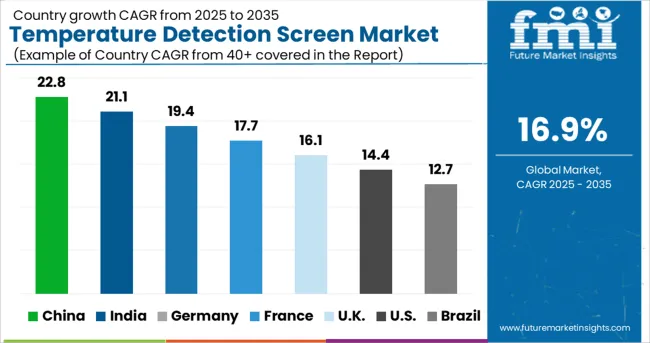
“Developing Healthcare Infrastructure to Boost Temperature Detection Screen Demand”
India has seen an increase in instances of multiple infectious diseases in recent years and in the pandemic of 2024 when the healthcare infrastructure proved to be inefficient in handling the world’s second-largest population, plans were put in place to develop healthcare infrastructure to combat any situation.
Increasing research and development, government initiatives for temperature detection screen companies, rising scope of application, etc. are some of the factors that could boost temperature detection screen sales.
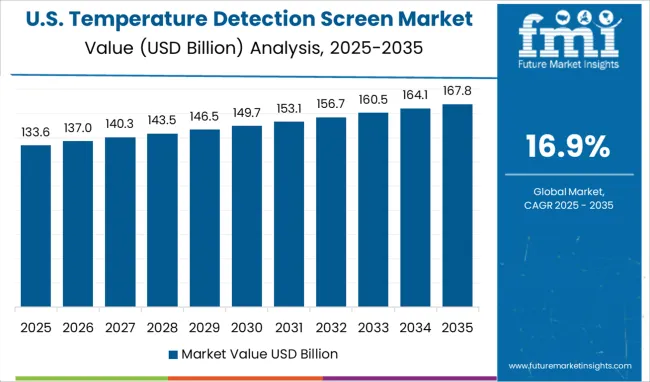
“Rapid Technological Advancements in the USA to Propel Temperature Detection Screen Shipments”
The USA has always been foremost in developing and implementing new technologies and this makes it a highly rewarding market for temperature detection screen companies. Thermal imaging has seen substantial rise in scope of application in military, security, and healthcare industries, and hence, research and development has also been fueled in the USA
Presence of key manufacturers and high demand from multiple end-use industries are majorly anticipated to influence the sales of temperature detection screens in the USA
“Healthcare Industry to Boost Sales of Temperature Detection Screens”
Focus on healthcare has bolstered in the past few years amidst a rise in the prevalence of multiple infectious diseases. Thermal imaging plays a crucial role in the healthcare industry as it is one of the most important diagnostic methods at the disposal of healthcare professionals. The healthcare industry accounts for a dominant market share of 24% in the global temperature detection screen marketplace.
Increasing healthcare expenditure across the globe, rising research and development in the healthcare industry are anticipated to boost demand for temperature detection screens in the healthcare industry and further bolster its dominance through 2035.
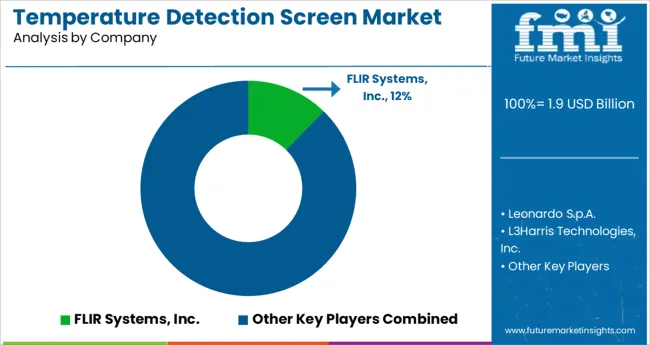
Temperature detection screen companies are focusing on developing new innovative technologies to develop new products and boost their sales revenues. Temperature detection screen manufacturers are also eyeing mergers and acquisitions to boost their market presence across multiple regions.
| Attribute | Details |
|---|---|
| Forecast Period | 2025 to 2035 |
| Historical Data Available for | 2020 to 2024 |
| Market Analysis | million for Value, Units for Volume |
| Key Regions Covered | North America; Latin America; Europe; East Asia; South Asia & Pacific; Middle East & Africa (MEA) |
| Key Countries Covered | United States, Canada, Brazil, Mexico, Germany, UK, France, Spain, Italy, China, Japan, South Korea, India, Indonesia, Malaysia, Singapore, Australia, New Zealand, Turkey, South Africa, and GCC Countries |
| Key Market Segments Covered | Product, Type, End Use, Region |
| Key Companies Profiled | FLIR Systems Inc.; Leonardo S.p.A.; L3Harris Technologies Inc.; Axis Communications AB; Opgal; OptoTherm Inc.; Thermoteknix Systems Ltd.; Fluke Corporation; Seek Thermal Inc.; 3M Company; C-THERMAL; Tonbo Imaging; Xenics; Infratec GmbH; Testo Se & Co. KGaA; COX; HGH Infrared Systems; Terabee; Vumii Imaging; AMETEK Land |
| Pricing | Available upon Request |
The global temperature detection screen market is estimated to be valued at USD 1.9 billion in 2025.
It is projected to reach USD 9.1 billion by 2035.
The market is expected to grow at a 16.9% CAGR between 2025 and 2035.
The key product types are infrared thermal scanning cameras and contactless temperature detectors.
portable/handheld segment is expected to dominate with a 63.7% industry share in 2025.






Full Research Suite comprises of:
Market outlook & trends analysis
Interviews & case studies
Strategic recommendations
Vendor profiles & capabilities analysis
5-year forecasts
8 regions and 60+ country-level data splits
Market segment data splits
12 months of continuous data updates
DELIVERED AS:
PDF EXCEL ONLINE
Temperature Controlled Pharmaceutical Packaging Solutions Market Forecast and Outlook 2025 to 2035
Temperature Monitoring Device Market Size and Share Forecast Outlook 2025 to 2035
Temperature Controlled Vaccine Packaging Market Size and Share Forecast Outlook 2025 to 2035
Temperature and Freshness Sensors Market Size and Share Forecast Outlook 2025 to 2035
Temperature Loggers Market Size, Share & Forecast 2025 to 2035
Temperature Controlled Pharma Packaging Market Size, Share & Forecast 2025 to 2035
Temperature Controlled Packaging Solution Market - Size, Share, and Forecast Outlook 2025 to 2035
Temperature Transmitter Market Growth - Trends & Forecast 2025 to 2035
Market Share Breakdown of Temperature Controlled Packaging Solutions
Temperature Sensors Market Growth - Trends & Forecast 2025 to 2035
Temperature Controlled Pharmaceutical Container Market Analysis, Size, Share & Forecast 2024 to 2034
Temperature Controlled Packaging Boxes Market
Temperature Sensing Foley Catheter Market
Temperature Calibrator Market
5G Temperature-Compensated Crystal Oscillator (TCXO) Market Size and Share Forecast Outlook 2025 to 2035
Low Temperature Flexible Tester Market Size and Share Forecast Outlook 2025 to 2035
Low-Temperature Cable Market Size and Share Forecast Outlook 2025 to 2035
Low Temperature Radiators Market Size and Share Forecast Outlook 2025 to 2035
Low Temperature Commercial Boiler Market Size and Share Forecast Outlook 2025 to 2035
Low Temperature Insulation Materials Market Size and Share Forecast Outlook 2025 to 2035

Thank you!
You will receive an email from our Business Development Manager. Please be sure to check your SPAM/JUNK folder too.
Chat With
MaRIA